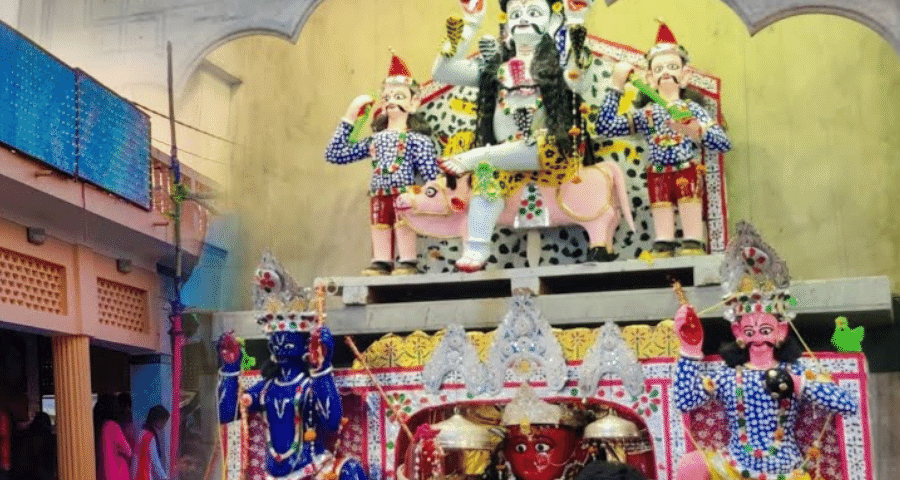Download Free Vegan Starter Kit -

At Begusarai's Durga Temple, A 700 Year Old Animal Sacrifice Tradition Finally Ends
October 5, 2022. In India, the colorful holiday of Navratri—which commemorates the goddess Durga's homecoming—is widely observed in villages and states. This fortunate event is observed in various ancient rituals and customs depending on the location. But this year, the Durga Temples in the Bhagwanpur block close to Begusarai broke a 700-year-old custom. Indeed, the well-known and oldest Durga Temple near Begusarai had a positive shift in ceremonies this Navratri.
Traditional animal sacrifices were performed in this ancient temple, but they have since been replaced. A new practice has taken the place of a 700-year-old habit during this Durga Puja.
The convention of animal sacrifice at the Durga Temple in Begusarai
According to legend, the Durga statue, or Shaktipeeth as it is known locally, was transported from Nadia in Bengal 700 years ago. The deity was constructed at Lakahnpur and worshipped as the Kuldevi. The sole temple in Begusarai that is thought to preserve the original Bengali customs is frequented by people from all walks of life.According to reports, worshippers in this location thought it was okay to sacrifice up to 10,000 animals during Durga Puja each year in hopes that their prayers would be answered.
The history of animal sacrifice across cultures
In ancient times, there was an understanding of blood as the sacred life element in both humans and animals. This is fundamental to animal sacrifice. The god thrives because of the sacrifice—and as a result, so do people and the natural world or so it was long believed. Blood sacrifices have been used for a variety of objectives, including earth fertility, purification, and atonement. Bloodletting was not the only purpose or method of animal sacrifice, though. Animals of all kinds have been used as sacrifices throughout history. A variety of significant domestic animals, including the goat, ram, bull, and ox, in ancient Greece and India, for instance. Additionally, edible birds, wild game, and fish were employed in Greek religion.
The type and quantity of animals used for the various sacrifices in ancient Judaism were precisely prescribed in order for the offering to be accepted and hence be fully effective. Often the offering must be suitable for the deity to which it is being offered or for the purpose for which it is being offered. The animal or plant used as the sacrifice was frequently closely linked to the deity to whom it was offered as the deity's incarnation or symbolic image.
Indian laws and statutes on the subject
Today, many Indian states already have legislation in existence that forbid the religious sacrifice of any animal in any temple or inside its grounds, including Gujarat, Kerala, Puducherry, and Rajasthan. Additionally, animal sacrifice is not permitted in any public house of worship or adoration, its immediate vicinity, or during any gathering or procession associated with a religious observance on a public street in the states of Andhra Pradesh, Karnataka, and Telangana. The Supreme Court of India directed in a 10 April 2017 order that animals could be killed only in an area set up in accordance with the law and that the municipal authority would be required to ensure compliance. The Supreme Court through a 17 February 2017 order directed that killing animals without following the Government of India’s compendium of acts and rules on animal transport and slaughter is a punishable offense.
The heartening change and abolishment of the tradition
According to sources, the Maa Durga Temple Pushpalata Ghosh Charitable Trust is in charge of running the temple. The committee made the decision to discontinue this long-standing practice and institute fresh rituals in an effort to bring about change. Now, worshippers will present the goddess Vaishnavi with fruits and vegetables including sugarcane and pumpkin.
No religion endorses the slaughter of animals, and chopping animals to death with weapons is just plain cruel. All religions encourage compassion. Animal sacrifice is harmful to everyone, as well: It normalizes killing and desensitizes kids to animal cruelty. Therefore, this custom that has been documented throughout the temple's history since it was founded has been transformed today. So, the change is heartening indeed!
Like this? Bombay High Court Bans Animal Slaughter in Homes, Public Areas in Mumbai Ahead of Bakrid
Read More: Top Celebs Who Spoke Against Animal Cruelty In The Name Of Religious Festivals
AUTHOR

trending
2.png)
Be a Vegan First Informer
Send us buzzworthy news and updates
Explore
Contact Us
About Us
Stay Connected
Copyright ⓒ 2017-2023. VEGAN PASSION PRIVATE LIMITED. All Rights reserved.
For more information, please write to hello@veganfirst.com
Registered Office Address: 55, 2nd floor, lane 2, Westend Marg, Saidullajab, Near Saket Metro Station, New Delhi, Gadaipur, New Delhi South West Delhi, DL

2.png)

.png)
.png)
2.png)
2.png)


1.png)

6.png)
